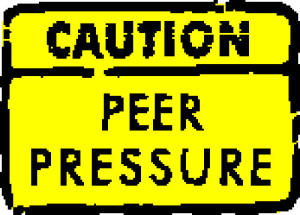 A female adult friend walked by, touched my hair, and said one word, “dark”. Instantly my brain shifted into high gear – what did she mean by that?? Was that a positive comment …? or was there a negative connotation? What tone was used with that one word?? What did she want me to get out of that observation, if anything? Later, after my emotional brain calmed down, my logical brain wondered: why do we care about what other people think? Why do we bother ourselves by reading too much into an offhand comment? It’s certainly not important in the scheme of things, so why do we waste time on thinking about it?
A female adult friend walked by, touched my hair, and said one word, “dark”. Instantly my brain shifted into high gear – what did she mean by that?? Was that a positive comment …? or was there a negative connotation? What tone was used with that one word?? What did she want me to get out of that observation, if anything? Later, after my emotional brain calmed down, my logical brain wondered: why do we care about what other people think? Why do we bother ourselves by reading too much into an offhand comment? It’s certainly not important in the scheme of things, so why do we waste time on thinking about it?
As much as we may think or say that we don’t care about what other people think about us, deep down we do care, we have to care, we’re hardwired to care. Part of survival requires cooperation, which means we have to care about others and facilitate their cooperative efforts if we are to survive. While in an adult may be able to brush off an offhand comment as truly unimportant, it is much harder for an adolescent to do the same with their peers. Why is peer opinion oh so important in adolescence?
As an adolescent moves from childhood to adulthood, with some thinking erroneously that they are already they are (“I’m not a baby anymore; if you haven’t noticed, I’m pretty much all grown up”) because of their often full adult size, they are moving into strange new territory and uncharted waters. Who better to help them navigate this foreign turf except others who are going through it with them, their peers. Fitting in with their peers becomes immensely important; the pressure to fit in consumes their waking hours.
Have you ever noticed that when you’re traveling in a foreign land or going through a new experience and you see a fellow traveler, that you create a nearly instant bond with that person? The old expression ‘misery loves company’ has validity. Adolescents are going through similar difficult times, as they are moving in unfamiliar terrain, filled with new emotions and novel experiences. So of course they bond closely with their fellow comrades in arms.
The opinion of peers takes on great weight and can make or ruin a teen’s mood, when just a look or a single word is interpreted wrongly. And their parent’s opinion matters little since family is not the group that they need to fit in with. An adolescent’s very identity is being formed, with the help of their peers’ influence, and they must move away from their parents to do so.
To make things worse, adolescence overlaps with great physical changes that make them very self-conscious about their physical appearance. Height, weight, acne, sexual development, all brought on by the onset of puberty make self-image and the accompanying self-esteem a real battleground.
COMMUNICATION TAKEAWAY: Adolescents have many challenges that they are going through, with peer pressure – a self-imposed need to fit in – as a big part of this stage. To help them through parents can do several things. One is to refrain from making derogatory remarks about the teen’s physical appearance. Understanding the extreme sensitivity of the teen’s physical appearance offers good support during the difficult years. Another is to recognize the importance of friends to your teen and to not put them down. Making time to talk about peer pressure and how to manage it helps your teen make independent decisions.
